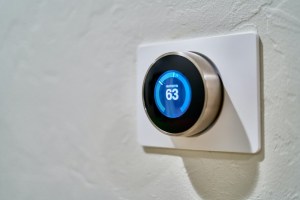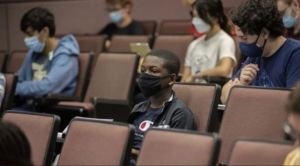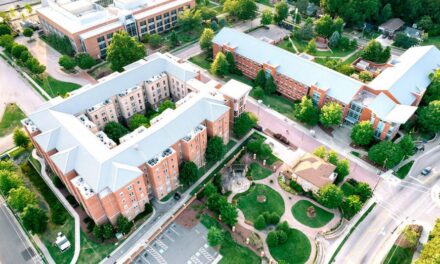By Tashi McQueen,
AFRO Political Writer,
tmcqueen@afro.com
Councilwoman Brooke Pinto, Ward 2, called for the D.C. Construction Codes Coordinating Board (CCCB) to reconsider the time frame on which building owners must turn on communal air conditioning for residents in the District.
Pinto argues that the current time frame does not address the temperature irregularities of climate change, which is impacting D.C and cities around the world.
“I had been hearing from residents across the city over the last several weeks complaining about how hot it is in their apartment units,” Pinto said to the AFRO, during unseasonably warm weather in early April. “I started looking more into why that is and what the regulations surrounding this were. CCCB is supposed to update the regulations around air conditioning units every three years, but they have not been updated in 10 years.”
The overall Construction Code has been updated every three years. According to the D.C. Department of Buildings website, the 2017 District of Columbia Construction Code became effective in May 2020. It is still in use.
“I think it’s really important that we stay on top of this and act quickly to ensure that residents can live comfortably in their homes during these hot months,” said Pinto.
On April 19, put her thoughts into a letter.
“I wrote a letter to Marc Fetterman, the acting chairperson of the Construction Codes Coordinating Board. I’m grateful that five of my colleagues signed this letter,” she said.
Council members Charles Allen of Ward 6, Christina Henderson an at-large council member, Brianne K. Nadeau of Ward 1, Zachary Parker of Ward 5 and Robert C. White Jr., also an at-large, supported the call to action.
According to the letter, the code currently requires that between May 15 and September 15 annually, owners and operators keep cooling systems at an inside temperature of no higher than 78 degrees Fahrenheit or– at minimum–15 degrees less than the outside temperature.
Pinto and her colleagues are also asking for the board to review how often they update the codes so that they may be more appropriate for the rapid changes climate change causes.
On May 3, Councilmembers Henderson, Allen, Janeese Lewis George, Parker, Pinto and Nadeau announced a new bill to support the cause, “The Cooling Our Overheated Living Spaces (“COOLS”) Regulation Amendment Act of 2023”.
If passed, the bill “would require landlords to maintain air conditioning units to provide inside temperatures 15 degrees Fahrenheit less than outside temperatures between April 15 and October 31 of each year. The legislation would also amend regulations to require that air conditioning be inspected and maintained between September 1 and April 1 of each year, and any defects discovered during the inspection must be corrected by May 1.”
The act also acknowledges sustainable energy efforts that must be made with suggested extended air conditioning and they intend to counter that with energy efficiency grants.
“The District has some of the most robust energy efficiency goals in the nation, but changes to local weather trends depend on global energy policies and renewable energy take-up. We must update regulations to reflect this new climate reality and ensure safe interior temperatures for those residents who depend on their landlords for access to air conditioning,” said Councilmember Henderson in a press release.
“We have a warming climate. We are aware of that,” said Pinto.
According to the Environmental Defense Fund (EDF), annually topped record-high temperatures “are likely due to human-caused global warming. Making extreme heat events more frequent.”
Humans cause global warming by burning fossil fuels for gas and powering our communities, through livestock – A single cow produces between 154 to 264 pounds of methane gas per year – and clearing trees according to the EDF and the U.S. Environmental Protection Agency.
Not only has climate change caused unusually high temperatures but all-around inconsistent weather, as evidenced by recent D.C. temperatures. According to an AccuWeather report, on May 8 the temperature ranged from 84 to 58 degrees Fahrenheit, but the average temperature is 75 to 56 degrees, while last year’s forecast was 58 to 44 degrees.
“These nuances are why I am asking the Construction Codes Coordinating Board to review the current policy and develop regulations that meet our needs in the wake of unpredictable weather fluctuations,” said Pinto.
The Mayor established the CCCB to replace the Building Code Advisory Committee (BCAC) in March 2009. It is in charge of reviewing and updating the Construction Codes for the District to meet present-day demands.
“We are urging the board, which has expertise in this, to study and look at the trends and temperatures to make a recommendation [of the new dates should be] based on those numbers,” said Pinto.
When asked if she would ensure primarily Black residences will not be excluded from this impact, Pinto said, “There are certain parts of the city that are literally hotter than others such as predominantly Black Wards 7 and 8.”
“I’m urging the board to implement the code fairly across the District,” she continued. “If they don’t, then legislators will need to make it a legislative affair.”
The next phase is to get the Technical Advisory Group to take ownership of this issue and temperatures and make some recommendations for enforcement.
Pinto said she hopes residents will see changes this fall.
“I don’t anticipate them updating the timeline before May 15,” said Pinto. “I hope they will update it by the time we hit the September 15 deadline.”
Tashi McQueen is a Report For America Corps Member.
The post Councilwoman Brooke Pinto addresses District’s outdated air conditioning codes as weather is impacted by climate change appeared first on AFRO American Newspapers .











